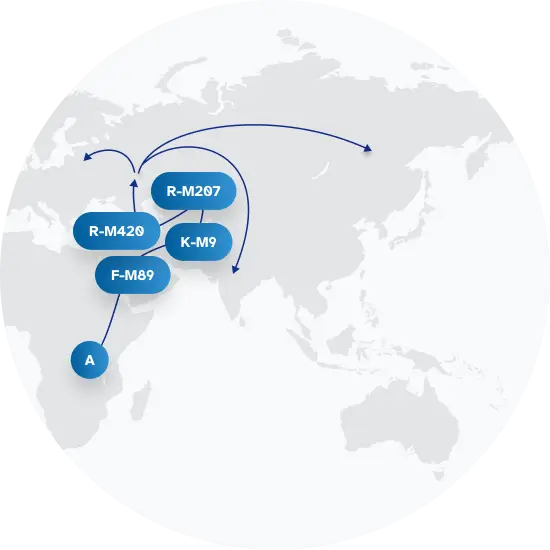Explore the Family Name Wilk
How common is the last name Wilk in the United States?
Based on the Decennial U.S. Census data, the popularity of the surname "Wilk" has seen a slight decrease in rank from 5622 in 2000 to 5971 in 2010, marking a 6.21% decline. Despite this, the actual count of individuals with this surname increased by 1.78%, going from 5662 in 2000 to 5763 in 2010. This suggests that while the name may have become less common relative to other surnames, the number of people with the name "Wilk" has actually grown. The proportion of people named "Wilk" per 100,000 decreased by 7.14% over the same period.
| 2000 | 2010 | Change | |
|---|---|---|---|
| Rank | #5,622 | #5,971 | -6.21% |
| Count | 5,662 | 5,763 | 1.78% |
| Proportion per 100k | 2.1 | 1.95 | -7.14% |
Race and Ethnicity of people with the last name Wilk
The Decennial U.S. Census also provides interesting insights into the ethnic identities associated with the surname "Wilk". In 2000, a large majority (96.84%) identified as white, which slightly dropped to 95.87% in 2010. Those identifying as Asian/Pacific Islander saw a substantial increase (67.57%), albeit from a small base of 0.37% in 2000 to 0.62% in 2010. Similarly, those of American Indian and Alaskan Native ethnicity saw their numbers grow by 72.73%, although they still only represent a small fraction of the total at 0.19% in 2010. Hispanic representation also increased by 57.84%, moving from 1.02% in 2000 to 1.61% in 2010. Individuals identifying with two or more races saw a slight decrease (-3.42%) over the decade, while those identifying as black saw a moderate increase (16.33%).
| 2000 | 2010 | Change | |
|---|---|---|---|
| White | 96.84% | 95.87% | -1% |
| Hispanic | 1.02% | 1.61% | 57.84% |
| Two or More Races | 1.17% | 1.13% | -3.42% |
| Asian/Pacific Islander | 0.37% | 0.62% | 67.57% |
| Black | 0.49% | 0.57% | 16.33% |
| American Indian and Alaskan Native | 0.11% | 0.19% | 72.73% |
Wilk ancestry composition
23andMe computes an ancestry breakdown for each customer. People may have ancestry from just one population or they may have ancestry from several populations. The most commonly-observed ancestry found in people with the surname Wilk is Eastern European, which comprises 37.7% of all ancestry found in people with the surname. The next two most common ancestries are British & Irish (18.9%) and Ashkenazi Jewish (15.4%). Additional ancestries include French & German, Italian, Scandinavian, Spanish & Portuguese, and Indigenous American.
Ready to learn more about your ancestry? Get the most comprehensive ancestry breakdown on the market by taking our DNA test. Shop 23andMe
| ANCESTRY BREAKDOWN | COMPOSITION |
|---|---|
| Eastern European | 37.7% |
| British & Irish | 18.9% |
| Ashkenazi Jewish | 15.4% |
| Other | 28.0% |

Possible origins of the surname Wilk
Your DNA provides clues about where your recent ancestors may have lived. Having many distant relatives in the same location suggests that you may all share common ancestry there. Locations with many distant relatives can also be places where people have migrated recently, such as large cities. If a large number of individuals who share your surname have distant relatives in a specific area, it could indicate a connection between your surname and that location, stemming from either recent ancestral ties or migration.
Based on 23andMe data, people with last name Wilk have recent ancestry locations in Poland and the United Kingdom of Great Britain and Northern Ireland.
| RECENT ANCESTRY Location | Percentage |
|---|---|
| Masovian Voivodeship, Poland | 60.90% |
| Podkarpackie Voivodeship, Poland | 59.80% |
| Lesser Poland Voivodeship, Poland | 58.60% |
| Podlaskie Voivodeship, Poland | 50.30% |
| Greater Poland Voivodeship, Poland | 49.70% |
What Wilk haplogroups can tell you
Haplogroups are genetic population groups that share a common ancestor on either your paternal or maternal line. These paternal and maternal haplogroups shed light on your genetic ancestry and help tell the story of your family.
The top paternal haplogroup of people with the surname Wilk is R-L260, which is predominantly found among people with European ancestry. Haplogroup R-L260 is descended from haplogroup R-M420. Other common haplogroups include R-M417 and R-CTS3402, which are predominantly found among people with European and European ancestry. Other surnames with similar common haplogroups are: Sikora, Baran, Majewski, Kozak, Gregor, Zielinski, Molnar, Rutkowski, Wojciechowski, Dudek.
The most common maternal haplogroups of people with Wilk surname are: H1c, H1, H. These most commonly trace back to individuals of European ancestry.
 Paternal Haplogroup Origins R-M420
Paternal Haplogroup Origins R-M420Your maternal lineage may be linked to Marie Antoinette
Because it is so dominant in the general European population, haplogroup H also appears quite frequently in the continent's royal houses. Marie Antoinette, an Austrian Hapsburg who married into the French royal family, inherited the haplogroup from her maternal ancestors. So did Prince Philip, Duke of Edinburgh, whose recorded genealogy traces his female line to Bavaria. Scientists also discovered that famed 16th century astronomer Nicolaus Copernicus traced his maternal lineages to haplogroup H.

What do people with the surname Wilk have in common?
Spoiler alert: it's complicated. People with the same last name are usually no more genetically similar than a randomly sampled group of people from the same population. That said, people with the same surname are more likely to have similar ancestries than randomly sampled individuals. The reason is the tendency of people with similar cultural or geographical backgrounds to preferentially mate with one another. That's why people who share a surname may be more likely to share traits and tendencies in common than people within the general population. Check out the percentages below to see the prevalences of tastes, habits, and traits of people with your surname compared with prevalences among 23andMe users.
Preferences
Traits
Habits
Wellness
Are health conditions linked to the last name Wilk?
The short answer is that, if there is an association between surname and health, it's usually more about your ancestry than your name. Individuals with a given surname are no more genetically similar than the general population but often have similar ancestries. The populations of people associated with those shared ancestries often have sets of genetic variations, also known as alleles, in common. Some of those alleles are associated with a greater likelihood of developing certain diseases.
Disease variant frequency by ancestry
Disease allele frequencies in populations associated with the surname Wilk are shown below. Important Note: not everyone with a disease allele will develop these health condition






















